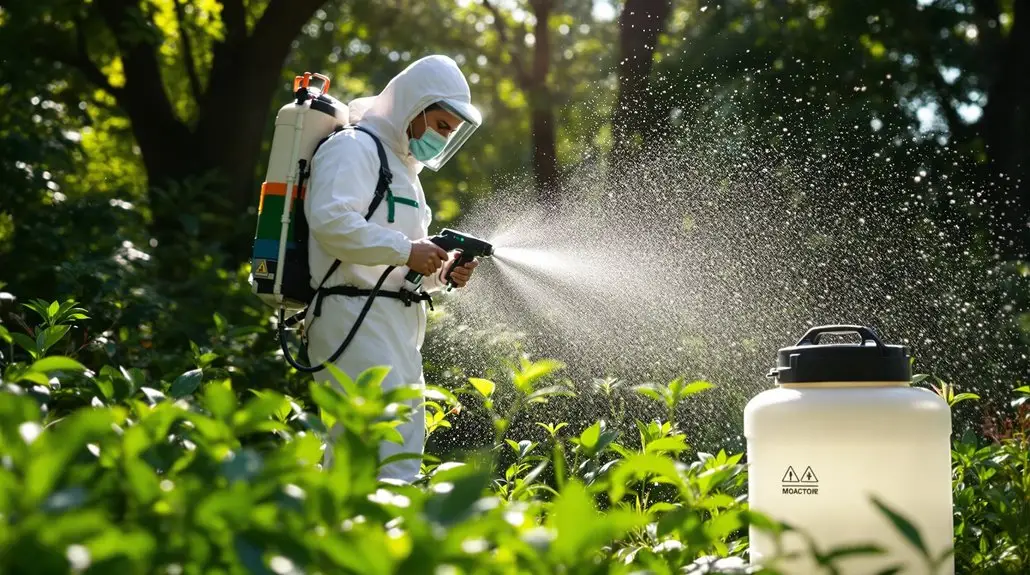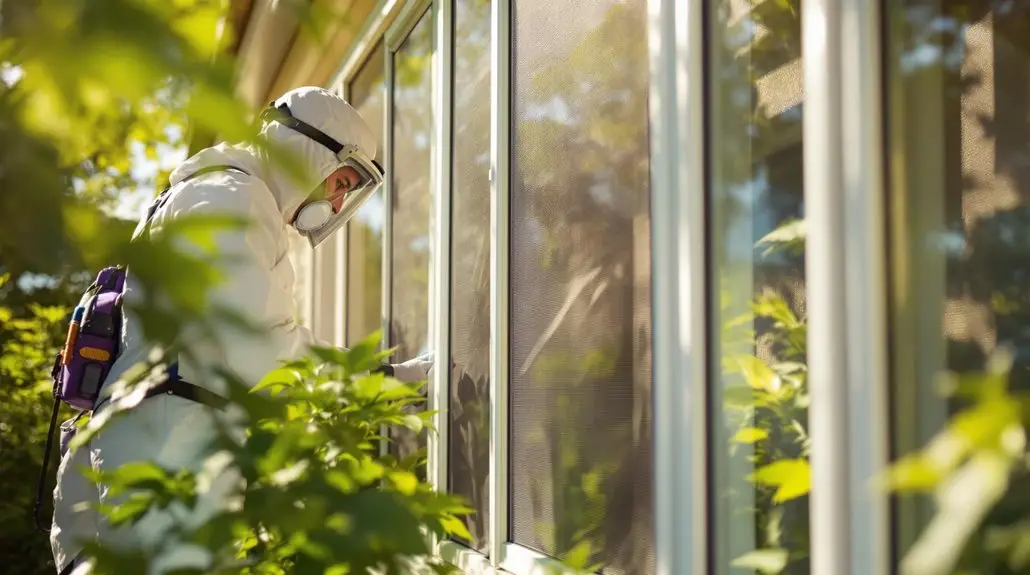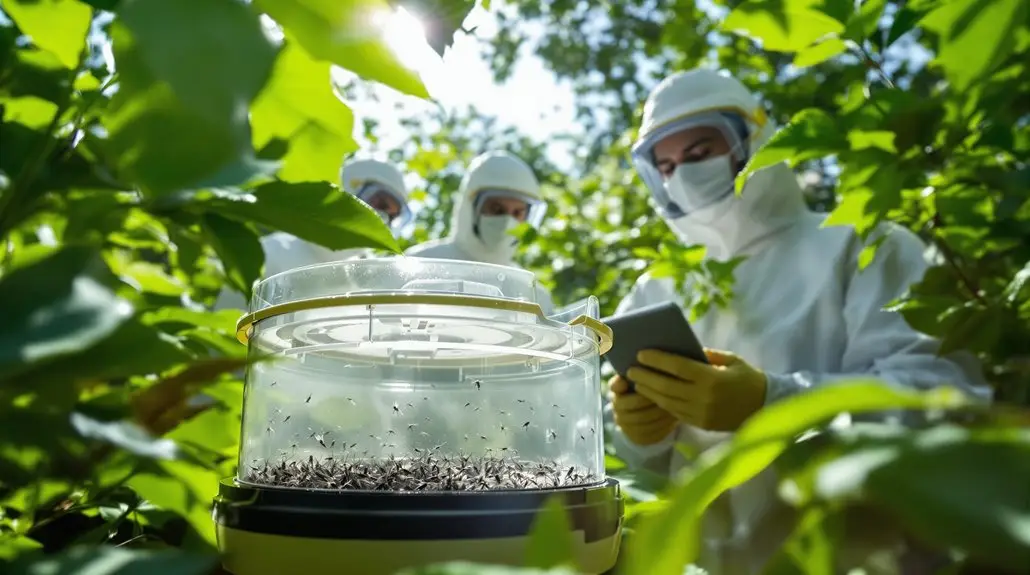You’re about to uncover essential secrets from experts on effective mosquito control. One key method is integrated management, which focuses on surveillance and community involvement to eliminate breeding sites. Tailored inspection reveals specific mosquito habitats, while eco-friendly treatments provide long-term solutions. Utilizing targeted insecticides and natural predators can drastically reduce populations. Implementing structural barriers, like screens and netting, adds an extra layer of defense. Don’t forget regular maintenance to keep your space mosquito-free. There’s so much more you can do to enhance your outdoor enjoyment—stick around to discover additional tips that experts swear by!
Key Insights
- Effective mosquito control relies on thorough surveillance and collaboration with health agencies to identify breeding sites and species presence.
- Tailored inspection and treatment plans address specific environments, ensuring targeted and efficient mosquito management.
- Utilizing eco-friendly insecticides and precise application techniques minimizes environmental impact while effectively reducing mosquito populations.
- Incorporating biological control methods, such as introducing mosquito fish, enhances sustainability and reduces reliance on chemical treatments.
- Implementing structural and physical barriers, like maintaining proper drainage and using netting, significantly prevents mosquito breeding in residential areas.
Integrated Mosquito Management Strategies

When it comes to tackling mosquito populations, integrating various management strategies is vital to success. You can start by understanding the significance of mosquito surveillance. Collaborating with agencies like the CDC and your state health department helps track mosquito species and breeding sites effectively. By using traps and monitoring historical data, you can identify problem areas and anticipate future populations.
Next, focus on source reduction and habitat management. This means eliminating standing water and organizing community cleanup drives to dispose of containers that can hold water. You might even consider modifying local habitats, like regrading drainage ditches, to prevent water accumulation. Effective integrated mosquito management plans require community involvement, as they ensure a comprehensive approach to reducing mosquito populations. Additionally, implementing professional mosquito control services can provide expert guidance in managing these efforts effectively.
When everyone pitches in, it strengthens your community and makes a significant impact on mosquito breeding.
Controlling mosquito life stages is another essential strategy. Utilizing larvicides and physical controls can effectively manage larvae, while adulticides will help keep adult populations in check. By applying these methods based on surveillance data, you can guarantee a targeted approach.
Tailored Inspection and Treatment Plans
Effective mosquito control begins with tailored inspection and treatment plans that address the unique needs of your property. A professional team will conduct a thorough inspection, pinpointing potential breeding sites and evaluating mosquito activity. They’ll assess your yard’s layout, identifying standing water and dense vegetation that attract these pests. This customized approach guarantees that the treatment is specific to your environment and the types of mosquitoes present. Additionally, they will consider the prevalent mosquito species in your area, ensuring a comprehensive strategy.
Here’s a glimpse of how this process unfolds:
| Step | Description | Purpose |
|---|---|---|
| Inspection | Identify breeding sites and mosquito habitats | Tailor treatment based on findings |
| Customized Treatment | Develop a plan with targeted products and schedules | Maximize effectiveness for your property |
| Ongoing Monitoring | Regular follow-ups and adjustments | Guarantee long-term mosquito control |
By creating a tailored treatment plan, you’re not just addressing an immediate problem; you’re investing in a solution that considers your property’s specific challenges. The right treatments target mosquito species and their preferred breeding areas, utilizing eco-friendly products that minimize environmental impact. You’ll receive ongoing support with regular inspections and maintenance recommendations, helping you keep your space enjoyable and mosquito-free. Additionally, year-round protection is provided for homes and yards to ensure that your mosquito control efforts remain effective throughout the seasons.
Ultimately, tailored plans foster a sense of belonging in your outdoor space, allowing you to reclaim it for family gatherings, barbecues, or simply relaxing in the sun. Don’t let mosquitoes dictate how you enjoy your property—embrace a customized approach to keep them at bay!
Effective Use of Insecticides

When it comes to effective mosquito control, targeted insecticide application techniques are essential for maximizing impact while minimizing risks. You need to take into account safety measures during spraying to protect not just yourself, but also the environment and vulnerable populations. Understanding these aspects will make your mosquito management efforts more efficient and responsible. Utilizing adulticides can significantly reduce mosquito populations and help control outbreaks of mosquito-borne diseases. Additionally, employing Integrated Pest Management (IPM) strategies enhances the overall effectiveness of your pest control efforts while promoting sustainability.
Targeted Insecticide Application Techniques
Targeted insecticide application techniques are essential for maximizing the effectiveness of mosquito control efforts.
When tackling mosquito populations, consider aerial spraying for extensive areas, like cities or farms. Aerial methods use ultra-low volume (ULV) sprays, allowing droplets as small as 80 microns to hang in the air, effectively reaching mosquitoes even after disasters like hurricanes.
For more localized efforts, ground ULV sprayers mounted on trucks or ATVs shine. These sprayers are ideal for neighborhoods, utilizing advanced technology for precise application. Timing your sprays at dusk or dawn aligns with peak mosquito activity, boosting your success. This timing is critical because night-time mosquito spray treatments are most effective when mosquitoes are most active.
Barrier treatments can be effective too. By applying insecticides to vegetation where mosquitoes rest, you create a protective shield. Using backpack systems, you can target specific areas without affecting your garden or lawn.
Lastly, don’t overlook larval control. Treating standing water with larvicides can greatly cut down adult populations by targeting immature stages.
Safety Measures During Spraying
Guaranteeing security during mosquito spraying is vital for both people and pets. Start by closing all street-facing windows and doors before the spraying begins. If you have window air conditioners or fans that pull in outside air, turn those settings off. Your central air unit can stay on, as it doesn’t take in outside air.
It’s best to remain indoors during the application; staying inside for 15-20 minutes afterward helps minimize your exposure. Additionally, it’s important to monitor local media for updates on the spray effectiveness and safety. For optimal results, consider utilizing mosquito control services that include effective insecticide application methods.
If you or anyone in your home has chemical sensitivities or respiratory conditions, it’s important to consult a physician beforehand. For your furry friends, bring pets indoors to keep them protected. If that’s not possible, cover their cages securely. Although outdoor pets are unlikely to experience adverse effects, bringing them inside is still the best option.
Once the spraying is over, wait about 15-20 minutes before opening windows and turning on fans. Remember to wash any clothes or outdoor items that were exposed during spraying.
Biological and Cultural Control Methods
When it comes to mosquito control, utilizing natural predators can greatly reduce larvae populations. You can also eliminate standing water around your property and manage aquatic vegetation to create an environment less hospitable to mosquitoes. Incorporating mosquitofish as predators in water bodies can significantly enhance the effectiveness of these control measures. Additionally, NaturePest offers natural mosquito control solutions that prioritize safety and environmental sustainability.
Natural Predators Utilization
Utilizing natural predators is a highly effective strategy for controlling mosquito populations in both residential and commercial settings.
By introducing specific fish like Gambusia affinis, or mosquito fish, into ponds and water bodies, you can markedly reduce mosquito larvae. These fish are aggressive feeders, making them a great ally in your mosquito control efforts. You can also consider goldfish and guppies, which contribute to this biological control. Fish like bluegill and catfish also thrive in stagnant water, where mosquitoes lay their eggs.
Birds are another fantastic natural predator. Attracting purple martins, swallows, and ducks to your area can help keep adult mosquito numbers in check. Just set up birdhouses and provide food and water to invite these helpful birds into your space.
Don’t overlook insects like dragonflies and damselflies, which enthusiastically feast on both larvae and adult mosquitoes.
You might even welcome amphibians like frogs and toads, which are known to consume mosquitoes in various stages.
By fostering a balanced ecosystem with these natural predators, you can create a welcoming environment that not only minimizes mosquito populations but also enhances your outdoor experience.
Embrace these methods, and you’ll find yourself enjoying your space mosquito-free!
Standing Water Elimination
Standing water is a prime breeding ground for mosquitoes, making its elimination essential for effective control. You can take several straightforward steps to reduce standing water in your surroundings.
Start by emptying buckets, flowerpots, trash cans, and patio furniture covers regularly. Turn over or dispose of any containers that can hold water, and cover those that can’t to prevent collection. If you leave containers outdoors, drill holes in the bottom to allow drainage, and store items like flower pots and wheelbarrows upside down.
For water features and ponds, consider stocking them with mosquito fish or running fountains and waterfalls to keep water moving. Change the water in bird baths and pet dishes at least once a week, and aerate your ornamental ponds to improve oxygen levels. Regular maintenance can reduce your risk of mosquito habitats.
Also, maintain your home’s infrastructure by keeping gutters clean, repairing leaks, and ensuring proper drainage.
Don’t forget to secure screens on your windows and doors to keep mosquitoes out. Together, by taking these simple actions, you can create a more enjoyable outdoor space for you and your loved ones.
Aquatic Vegetation Management
Eliminating standing water is just the first step in effective mosquito control; managing aquatic vegetation plays an important role as well. You’ll want to trim overgrown plants and remove any overhanging bushes or trees that can create shady resting spots for adult mosquitoes. By regularly maintaining the vegetation around your pond, you reduce potential breeding sites and enhance the beauty of your space. Additionally, the presence of stagnant water can significantly contribute to mosquito reproductive cycles, highlighting the importance of proper vegetation management.
Here’s a quick look at some methods for managing aquatic vegetation:
| Vegetation Management | Impact on Mosquito Control |
|---|---|
| Trim overgrown vegetation | Reduces shaded areas for adult mosquitoes |
| Plant native specimens | Attracts beneficial insects and birds |
| Control undesirable vegetation | Minimizes breeding habitats |
| Utilize specific aquatic plants | Causes mosquito mortality |
| Modify embankments of shallow areas| Deters mosquito breeding
Structural and Physical Barriers

Creating effective structural and physical barriers is vital for keeping mosquitoes at bay. By implementing these barriers, you not only protect yourself but also create a more inviting space for everyone.
Here are three actionable steps you can take:
1. Seal Your Home: Install window and door screens if you haven’t already. Make certain they’re “bug tight” and cover any gaps in walls, doors, and windows. This keeps those annoying mosquitoes from making their way indoors.
2. Create Outdoor Shields: Use screens or netting around outdoor areas like porches and patios. These simple additions can greatly reduce your exposure while you enjoy the fresh air. Regularly changing water in bird baths and fountains is also essential for preventing mosquito breeding habitats.
Don’t forget to completely cover baby carriers and beds with netting to protect vulnerable individuals.
3. Treat Your Property’s Perimeter: Treat the areas near your home, extending out to 50 feet if necessary. Focus on shady spots, under decks, and anywhere standing water tends to collect.
This proactive approach helps eliminate mosquito breeding grounds before they become a hassle.
Ongoing Maintenance and Monitoring
To effectively manage mosquito populations, ongoing maintenance and monitoring are essential. Regular surveillance helps you track larval and adult mosquitoes throughout the season, ensuring your community stays secure from potential outbreaks.
Using tools like ovitraps, dippers, and CDC light traps, you can gather critical data on mosquito numbers, species distribution, and environmental factors that influence their populations.
By comparing current data with previous weeks and years, you can identify trends and predict problem areas. This proactive approach allows you to act swiftly, whether it’s increasing larvicides in specific zones or conducting targeted adulticide treatments.
The monitoring process also includes testing mosquitoes for diseases like West Nile virus, enabling you to detect threats before they reach your neighborhood.
Moreover, highly trained mosquito biologists play an essential role in identifying and testing these pests. They can pinpoint specific diseases weeks ahead of human transmission, prompting earlier control measures.
Monitoring dead birds for viruses further enhances your understanding of local virus activity levels.
Frequently Asked Questions
How Long Does a Typical Mosquito Control Treatment Last?
A typical mosquito control treatment lasts about 1 to 2 months, though some can be effective for 4 to 8 weeks.
You’ll notice that factors like local weather and mosquito population size can influence how long it works.
During peak season, you might need to reapply every 4 to 6 weeks.
Keeping your yard tidy and eliminating standing water will also help you enjoy your outdoor space without those bothersome mosquitoes buzzing around!
Are Mosquito Control Products Safe for Pets and Children?
When it comes to mosquito control products, security for your pets and kids is a top concern.
You’ll want to avoid chemicals like DEET and malathion, as they can be toxic. Instead, consider using more secure alternatives like peppermint or cedarwood oil.
Always follow product instructions and keep your pets away from treated areas for a while.
What Time of Year Is Best for Mosquito Control?
The best time of year for mosquito control is late winter to early spring.
As temperatures rise above 50°F, mosquitoes start to emerge, making this period ideal for preventive spraying.
By targeting both larvae and adults early on, you can greatly reduce their population before they breed in large numbers.
If you live in a warmer region, consider year-round treatments to keep those troublesome mosquitoes at bay.
Enjoy your outdoor spaces without the irritation!
Can I Prevent Mosquitoes Without Using Chemicals?
Absolutely, you can prevent mosquitoes without using chemicals!
Start by planting mosquito-repelling plants like lemongrass and lavender around your home. Using essential oils, like lemon eucalyptus and neem, can keep them at bay too.
You could also set up oscillating fans to create a breezy environment that mosquitoes find hard to navigate.
Finally, make sure to eliminate standing water in your yard, as it’s a breeding ground for these pests.
You’ve got this!
How Do Weather Conditions Affect Mosquito Control Effectiveness?
Weather conditions greatly impact how effectively you can control mosquitoes.
When temperatures rise above 50°F, and humidity levels are high, mosquitoes become more active and breed more rapidly.
Heavy rainfall creates standing water, which serves as ideal breeding sites.
If you notice these conditions, it’s essential to regularly remove stagnant water and increase your control efforts.
Adapting your strategies to align with the weather will help keep your space more comfortable and mosquito-free.
Reclaim Your Evenings: Say Goodbye to Mosquitoes with NaturePest Holistic Pest Control!
As you explore the world of mosquito control, remember that the battle isn’t just about swatting away pests; it’s about shielding your peace of mind. Imagine your evenings free from buzzing interruptions, your family protected from bites and disease. With tailored strategies and expert insights from NaturePest Holistic Pest Control in South Florida at your fingertips, the power to reclaim your space lies in your hands. Don’t let these relentless invaders win! Take the first step toward a mosquito-free life today by contacting NaturePest for a personalized pest control plan that works for you. Your serene evenings await!



